Killer Coke Update | April 2, 2013
Coke's Greed Benefits from Targeting Children, the Poor & Workers
Contents of the Newsletter
- Coke executive: '... they don't need a Coke.' — FIRED!
- Annual meeting: Coke blocks human rights accountability
- Street Hype: 'Students vote to Kick Coke'
- '15 Minutes of Fact' on Coke's racial discrimination
- Coke sues to halt recycling
1. Coke Executive: '... they don't need a Coke.' — FIRED!
"The Extraordinary Science of Addictive Junk Food" by Michael Moss, The New York Times Magazine, February 20, 2013
"In his capacity, [former president and chief operating officer in both North and South America Jeffrey] Dunn was making frequent trips to Brazil, where the company had recently begun a push to increase consumption of Coke among the many Brazilians living in favelas [shanty towns]. The company's strategy was to repackage Coke into smaller, more affordable 6.7-ounce bottles... just 20 cents each...Coke was Dunn's concern, and on one trip, as he walked through one of the impoverished areas, he had an epiphany. 'A voice in my head says, "These people need a lot of things, but they don't need a Coke." I almost threw up.'
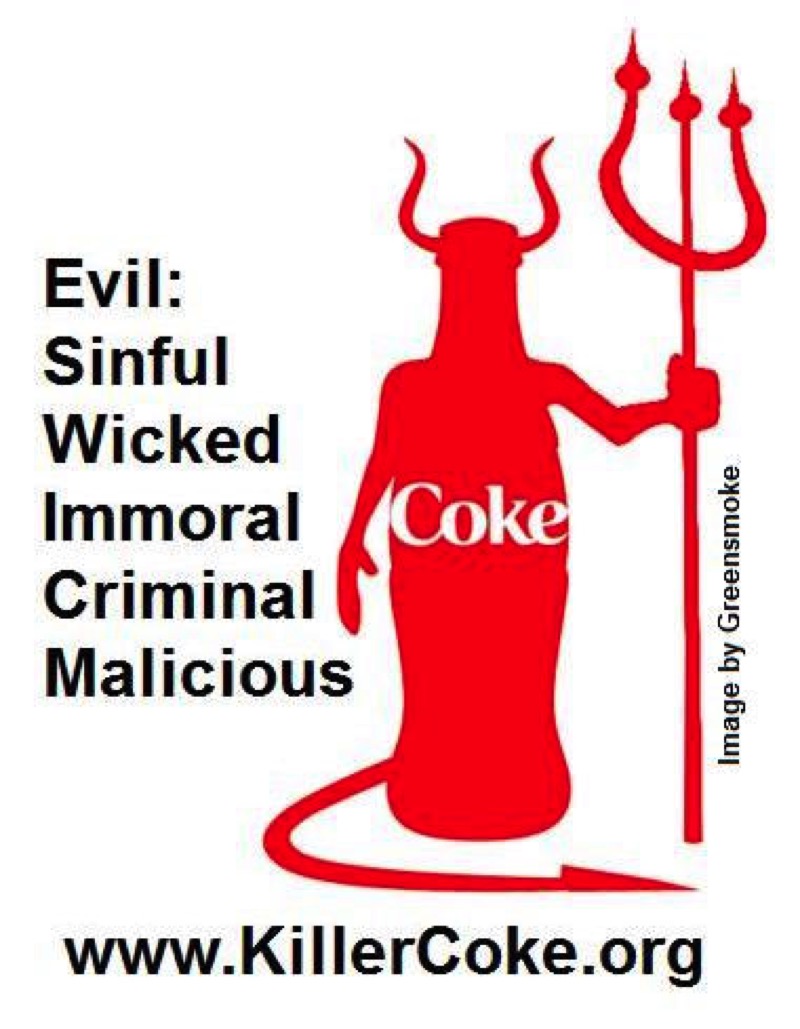
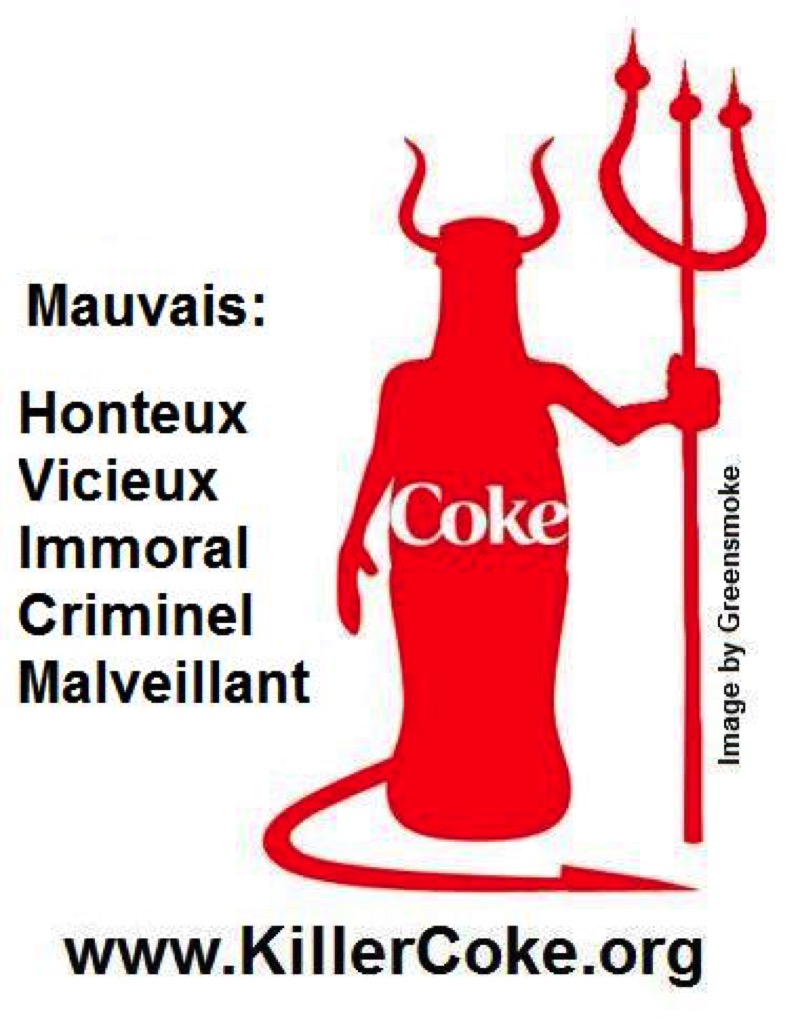
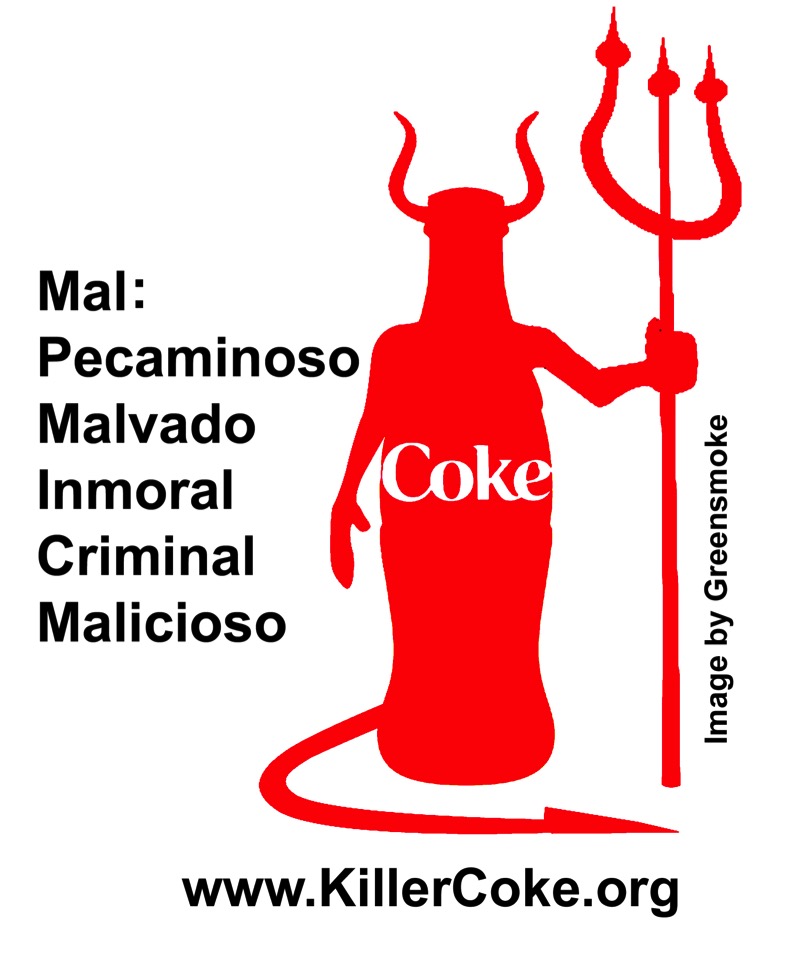
"Dunn returned to Atlanta, determined to make some changes...he did want to try to steer the company into a more healthful mode, and one of the things he pushed for was to stop marketing Coke in public schools...A director of one bottler wrote a letter to Coke's chief executive and board asking for Dunn's head. 'He said what I had done was the worst thing he had seen in 50 years in the business,' Dunn said...'I was an embarrassment to the company, and I should be fired.' In February 2004, he was."
Coke's policy to go into poor neighborhoods with their sugar beverages is common in countries throughout the world - especially to children of color. Here's an article posted on Campaign to Stop Killer Coke's website in Breaking News in Nov. 2011
Report: Soda Companies Target Black and Latino Kids in High Numbers
ColorLines: News for Action, by Jorge Rivas, Nov. 28, 2011
Read Article
"Black children and teens saw 80 percent to 90 percent more ads compared with white youth, including more than twice as many for Sprite, 5-hour Energy, and Vitamin Water.
"From 2008 to 2010, Latino children saw 49 percent more ads for sugary drinks and energy drinks on Spanish-language TV.
"Latino preschoolers saw more Spanish-language ads for Coca-Cola Classic, Kool-Aid, 7 Up, and Sunny D than older Latino children and teens did."
2. Annual meeting: Coke blocks human rights accountability
Coca-Cola's 2013 Annual Meeting will be held on Wednesday, April 24, 2013, at 9:30 am, at the Cobb Galleria Centre, Two Galleria Parkway, Atlanta, Georgia.
The Campaign to Stop Killer Coke plans to confront the company over their abysmal human rights and environmental record once again and we need your help.
Shareholders should now have gotten their proxies via email or in the mail.
There is a human rights resolution on the agenda for this meeting proposed by B. Wardlaw entitled, "Shareholder Proposal Regarding a Board Committee on Human Rights." Of course, the Company opposes this resolution as they have done in the past.

Credit: 'Coca-Cola La Formule Secrete'
Three things you can do to help hold Coca-Cola accountable:
- If you, or someone you know, have Coca-Cola stock, please contact us immediately, as we need proxies in order to send members of the campaign and our supporters into the annual meeting.
- Join us at the meeting yourself. If you have concerns about the way Coca-Cola abuses people and the environment, please consider joining us in Atlanta on April 24th. Contact us to coordinate plans.
- Make a contribution today. The Campaign to Stop Killer Coke is funded by supporters. A contribution of any amount goes a long way in covering the travel expenses involved with attending the annual meeting. A contribution can be made at KilleCcoke.org Contribute. It will be greatly appreciated.
Please contact the Campaign to Stop Killer Coke at (718) 852-2808 or e-mail us at info@killercoke.org as soon as possible so we will have time to organize the proxies in time for the meeting.
The annual meeting is an important event for the campaign. At last year's meeting, two-dozen members of Occupy Atlanta joined us and certainly got the attention of Coca-Cola CEO Muhtar Kent. As the Atlanta Journal Constitution reported about last year's meeting, "Protesters shouted a choreographed 'Point of order. You lie!' at least half a dozen times as Kent made remarks about everything from the company's commitment to diversity (it's currently embroiled in a discrimination lawsuit in New York) or accusations of worker intimidation in Mexico."
We look forward to hearing from you!
Excerpts from "Shareowner Proposal Regarding a Board Committee on Human Rights":
"Supporting statement:
"The Coca-Cola Company, its bottlers, and suppliers have been associated with human rights controversies, leading to:
"• Teachers Insurance and Annuity Association-College Retirement Equities Fund (TIAA-CREF) divesting 1.25 million shares of Coca-Cola Co. stock in July 2006, and banning further investments in its $9 billion CREF Social Choice Account, the nation's largest socially screened fund for individual investors;
"• More than 50 colleges and universities having removed Coke products from their campuses;
"• Coca-Cola paying $192 million in 2001, which was the largest race employment discrimination class action settlement in US history and Coca-Cola Bottling agreeing to pay $495,000 in back wages and interest to 95 African-American and Hispanic job seekers at a distribution facility in Charlotte, following an investigation by the U.S. Department of Labor; and
"• The International Environmental Law Research Centre accusing the company of detrimental impacts on drinking andagricultural water supplies in India, violating human rights.
"In the opinion of the proponents, the company's existing governance process does not sufficiently elevate human rights issues within the company or serve the interests of shareholders in expediting effective solutions. The proposed Bylaw would establish a "Board Committee on Human Rights that could review and make policy recommendations regarding human rights issues raised by the company's activities and policies.
"In defining 'human rights,' proponents suggest that the committee could use the US Bill of Rights and the Universal Declaration of Human Rights as nonbinding benchmarks or reference documents."
3. Street Hype: Students vote to Kick Coke: [page 1]
"Student activist Cathy Rojas reported that the Student Association of the University of Albany/State University of New York (SUNY) passed a resolution on December 5, 2012 seeking to make the University at Albany and all other SUNY campuses Coca-Cola-free..."

Students at SUNY/Albany not only want Coca-Cola off campus, but are also demanding the removal of Sodexo from their campus over worker exploitation and worker rights issues. It should be noted that Coca-Cola Co. board member Alexis Herman is chair of the Business Advisory Board of Sodexo.
SUNY is composed of 64 campuses with almost a half million students.
4. '15 Minutes of Fact' on Coke's Racial Discrimination
Listen to Jerry Ashton's Interview with Ray Rogers

"In today's '15 Minutes of Fact,' Ray Rogers will make some very serious allegations of racial discrimination in Coca-Cola bottling plants in the Greater New York City area along with his concerns regarding Coca-Cola's worldwide labor, human rights and environmental abuses."
5. Coke Sued Northern Territory, Australia, to Halt Recycling
The Northern Territory of Australia's cash for cans system has seen the recycling rate at least double since its introduction there. This means significantly reducing the amounts of plastic that will find their way into the oceans and into the stomachs of sea birds and other marine species.
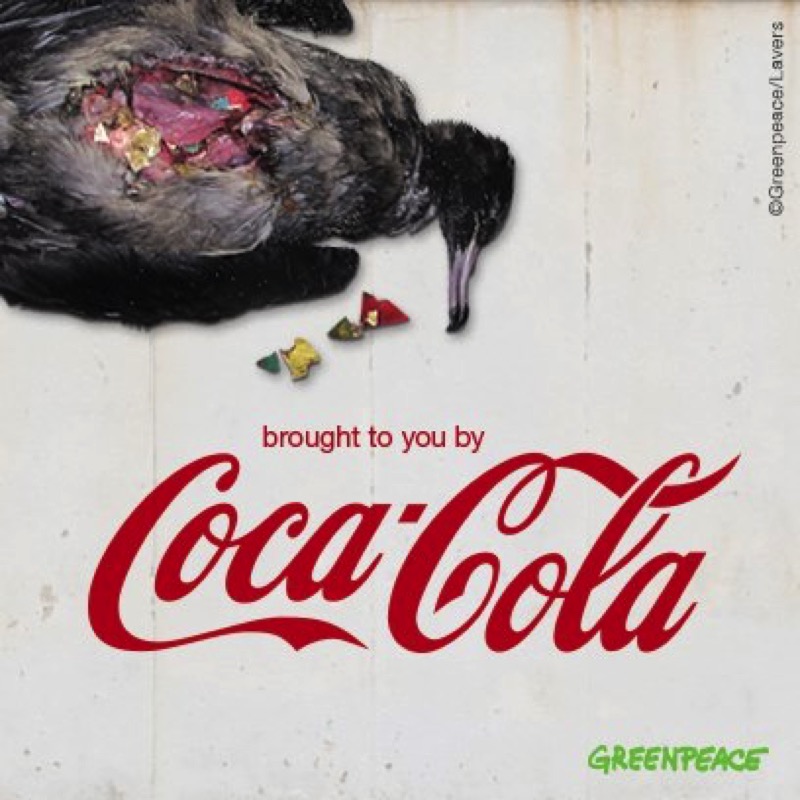
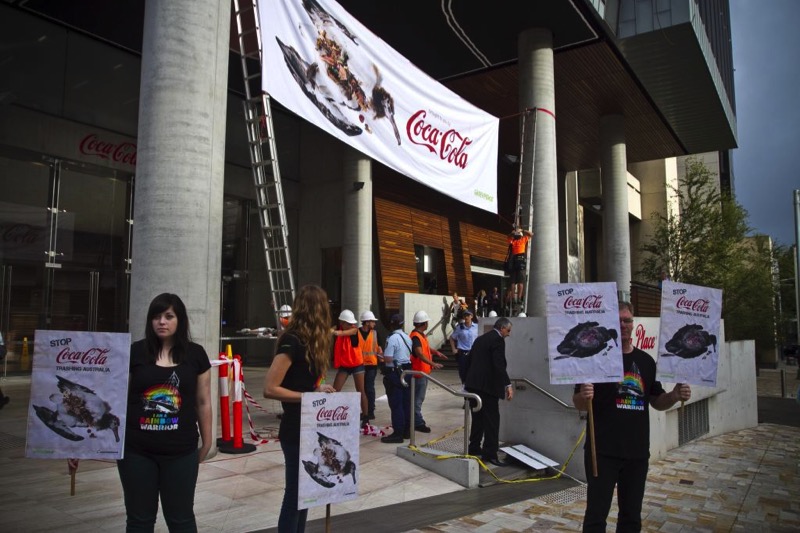
"[Out Of Order] OOO is currently taking world wide action against Coca Cola. Why? Because they sued [and won their lawsuit against the] Northern Territory government for using a highly successful recycling system.
"What this legal action demonstrates is that Coke would rather increase its profits than increase protection to vulnerable wildlife and that Coke thinks it has the right to interfere with laws if they adversely affect its profit.
"This is not just an Australian issue. Coke plastics reach wherever ocean currents take them or whichever migratory bird mistakes a piece for food. The same company [Coca-Cola] is already under fire globally for other shocking social and environmental abuses and we won't stand for it anymore."











